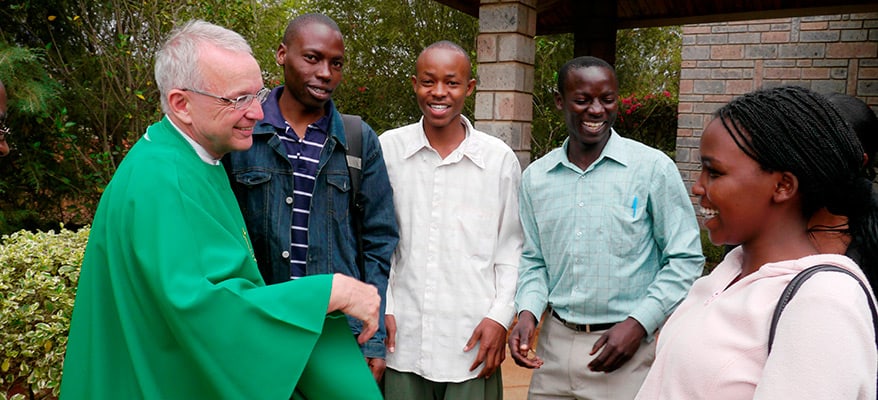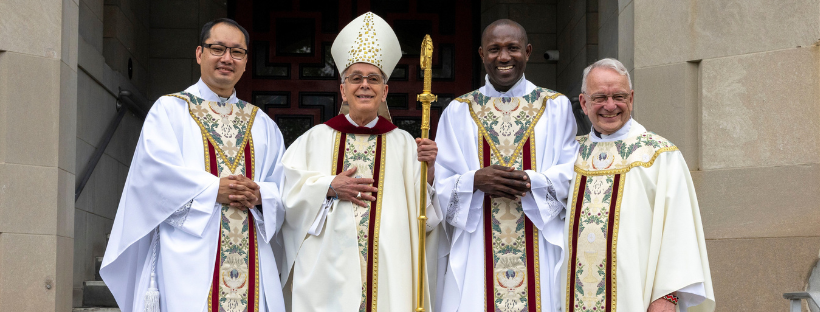Whenever we are talking about mission, inevitably we bring in the aspect of a people’s culture. Talking about the culture of a people includes their language, their history, and most important, their lifestyle. Even in the life of Jesus and his teachings, all these aspects are central to his life as a real human person. The same applies to every human being, no matter the person’s religion. Human beings are God’s language to us not only as Christians or Maryknollers, but simply as human beings. The fact that human beings are God’s language means that culture is an important reality in mission.
We OTP students experience mission with a people, a cultural community. This means we have to deeply experience their culture and lifestyle. The missioner and the welcoming community learn from each other as God mysteriously evangelizes both of us.
Under the guidance of Fr. Alejandro Marina and sometimes accompanied by Fr. Paul Sykora, we OTP students often visit the zone of TIPNIS in the Amazon. TIPNIS stands for Territorio Indígena y Parque Nacional Isiboro Secure. TIPNIS is a protected area and Native Community Land situated between the Cochabamba Department and the Beni Department (Chapare, Moxos, and Marbán provinces).
Our visits to TIPNIS give us an opportunity to experience mission with the many communities living in the Amazon. TIPNIS is home to the Moxeño, Chimané, and Yurakaré indigenous groups, who live from the land and are mostly hunters, fishers and gatherers. Meeting the people of these communities helps us to develop greater sensitivity to the importance of culture in misión. As part of the project of reforestation in the Amazon, we participate in tree planting in some communities that we visit.
During the weekend just after Pentecost, the Santissima Trinidad community holds a big celebration of three days to commemorate their founding in the Amazon. The celebration includes colorful cultural dances from the different communities inhabiting the Amazon and honors the creator and protector of these communities, in Christian terms the Holy Trinity. The celebration, which precedes a novena, has the Eucharist as its key event. In addition, families take this opportunity to introduce their sons and daughters to the Christian family through the sacrament of baptism.
The members of the community also observe and respect the liturgical calendar. They always ask for Mass during the special days in the church calendar; therefore, the absence of a priest or Eucharistic minister in these areas disappoints them. Here is where the catechist comes in to lead the people in prayer and celebratory processions. Whenever we OTP students visit these communities, we always try to help in the services and offer catechism classes to the children. Just recently, we participated in the procession and celebration of Corpus Christi in Santissima Trinidad which turned out to be a really beautiful celebration. It is always amazing to see how devoted the people are in reverence for God and mother nature.
Our faith in Christ and confidence in mission is strengthened when we are blessed with seeing the Christian faith manifested through the traditions, customs, and heritage that still exist in the indigenous cultures of the Amazon. The richness of a people united, living as one community, and taking pride in what the ancestors left behind. For the people living in the Amazon area, this is the heartbeat of their existence. In every communal activity, the entire community is happily involved and participates with pride in their rich heritage. A person from Africa could not be any happier than just experiencing this simple, humble, and kind encounter of life in the Amazon. We miss our homelands. We miss our families. But joining in Christ’s mission and experiencing life with the communities here gives us a taste of home and family in these beautiful and blessed fields afar. That is what mission is all about: getting to experience mission with sensitivity to culture, sharing in and listening to the stories of others though different from us, and ultimately learning the beauty and richness hidden in our cultures. Mission always is about God’s beautiful language: human beings.
This is the gift, the charism, that Maryknoll as a missionary society gives to us and the many people we encounter and interact with through evangelization. A gift that our Founders first received and passed to us to continue experiencing in the fields afar. Although it is not that easy to guard this precious gift for the generations to come, you can agree that there is beauty in the gift itself thanks to our Founders. There comes a time when once again this gift needs to germinate in the peripheries and the communities in the Amazon. The people of the Amazon show us that all humanity is in need of this gift. Shall we, then, pass it on for its growth as God continues his new creation in Christ?









